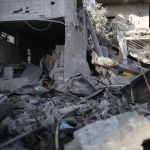The UN body said that 60 per cent of primary healthcare facilities have shut down in the Hamas-controlled enclave…reports Asian Lite News
Amid the raging Israel-Hamas conflict, hospitals in the Gaza Strip are “on the brink of collapse” as the number of patients treated or waiting to be receive treatment is at 150 per cent of the hospitals’ capacity, the UN Office for the Coordination of Humanitarian Affairs (OCHA) has warned.
In an updated situation report, the UN body said that 60 per cent of primary healthcare facilities have shut down in the Hamas-controlled enclave, while hospitals are struggling to operate amid shortages of power, medicine, equipment and specialised personnel.
“Only eight (out of 22) of UNRWA health centers in Middle, Khan Younis and Rafah governorates are providing primary health care services to critical outpatients and patients in need of treatment for non-communicable diseases,” the report said.
The water situation in Gaza also remains dire, the OCHA said, adding that the last functioning desalination plant shut down on October 15 due to lack of fuel, as did the last functioning wastewater treatment plant.
“Water production from municipal groundwater sources is at less than 5 per cent of the pre-hostilities level. The three seawater desalination plants, which, prior to the hostilities produced seven per cent of Gaza’s water supply, are currently not operational.
“Water trucking operations came to a halt in most areas due to the lack of fuel, insecurity and roads blocked by debris. Bottled water is largely unavailable, and its price has made it unaffordable for most families.
“Private vendors, who operate small water desalination and purification plants, which are mostly run by solar energy, became the main suppliers of clean drinking water,” it added.
According to the OCHA, sanitation in the Gaza Strip is also deteriorating as all the five wastewater treatments in Gaza have been shut down due to a lack of power.
As a result, a lot of sewage is being dumped in the sea and “most of the 65 sewage pumping stations are not operational”, the Office said, adding that trash is also piling up.
Food security is also unstable, with three out of the five World Food Programme (WFP) bakeries in Gaza closed on Friday due to fuel shortages and lack of ingredients, OCHA said.
Wheat flour across Gaza could run out in “about five days,” and only one of the five mills in Gaza is currently running.
Since the conflict erupted on October 7, the cumulative fatality toll in the Gaza Strip has increased to 4,137 as of Saturday morning, with 70 per cent of the fatalities being children and women, the Palestinian Health Ministry said.
The number of injured currently stands at 13,162, while more than 544,000 people are currently internally displaced.













